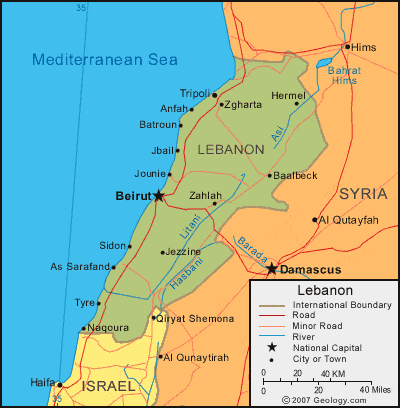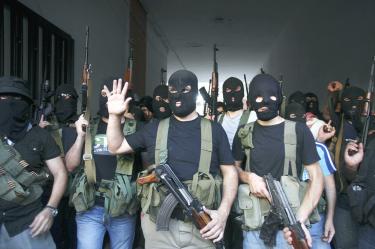The Syrian civil war is intermittently spilling over into its neighbors: Jordan, Turkey, and Lebanon. Of these three, Lebanon has been the most closely tied to the Assad regime in Syria, and it is no surprise that this small country is the most vulnerable to serious unraveling.
Syria and its four neighbors - Turkey, Lebanon, Jordan, and Iraq
The civil war itself in Syria has been well covered by journalists, and in this blog. The death toll is now estimated from 28 to 45,000, with the highest being reported by the Syrian Free Army (SFA). By October 2012, the FSA estimates another 28,000 people are "missing," as in taken by government security forces into custody. It goes without saying that the numbers of wounded and injured are considerably higher - hospitals and medical personnel are overwhelmed by the carnage.
As always, children are the most vulnerable in a war setting, and humanitarian efforts are always inadequate
The UN estimates another 1.2 million Syrians have been internally displaced within the country, and hundreds of thousands have fled across the border, principally to Turkey, next to Jordan, with smaller percentages into Iraq and Lebanon. The infrastructure of the country is further degraded daily as Syrian government forces are now routinely using air power in bombing and strafing opposition concentrations.
Syrian jet launches missile
The country's infrastructure crumbles daily
The most immediate impact on Syria's neighbors are from civilians fleeing the conflict. Refugee camps are being erected in Turkey primarily, Jordan second, while Iraq's desert border is less hospitable both in terms of access by most of the Syrian population, and lack of infrastructure in Iraq for this relief work.
Refugee camp being set up in Turkey.
Lebanon
Lebanon is a special case. It is in a fragile state politically, and a car bomb last week killed a senior intelligence official who was against Syria's Bashar al-Assad. The killing emphasized the presence and reach of Hezbollah in Lebanon, who strongly supports Assad, as does Iran. Because of the strategic dynamics of Iran and Hezbollah supporting Assad, the "arc" of belligerency in the region, Lebanon is especially challenged to remain independent and able to defend its borders.
Lebanon's capital, Beirut, is close to Syria's capital Damascus, and both are close to the borders with Israel
Masked gunmen from the al-Muqdad clan gather at the al-Muqdad family association’s headquarters in the southern suburbs of Beirut. As always, clan and tribal loyalties grow important in a region of tension, as middle or neutral ground erodes as an option for most civilians.
Lebanon has vast refugee camps from 1948 that have grown into permanent towns. Residents of this camp are Palestinians who fled the war of Arab nations against Israel when that country fought for its sovereignty. From the camps derives much of the manpower and ideology of Hezbollah.
Much of southern Lebanon is a security zone butting up against Israel - here a protest crowd confronts a line of Israeli soldiers.
The Syrian civil war continues to threaten the whole region. It will become one of many festering issues for the next US President as that country's election nears.
This is a big world, we happen to have been born into a dominant country, itself part of a prosperous and powerful Western civilization. We're "oversupplied" with news though it may not inform us well. "Six stories from seven continents" is a modest effort to remind ourselves there are snippets, events, and stories from all around the world to hear and learn from... that our awareness is incomplete, and life is breathtakingly more complex and wonderful than we usually imagine.
North Korea

The always bombastic and unpredictable North Koreans go hysterical again. This time the country is prepared to "go to war" with South Korea because that country is playing loudspeakers directed at North Korean territory. A headline from a UK paper reads, "More than 50 North Korea submarines 'leave their bases' as war talks with South continue "



No comments:
Post a Comment